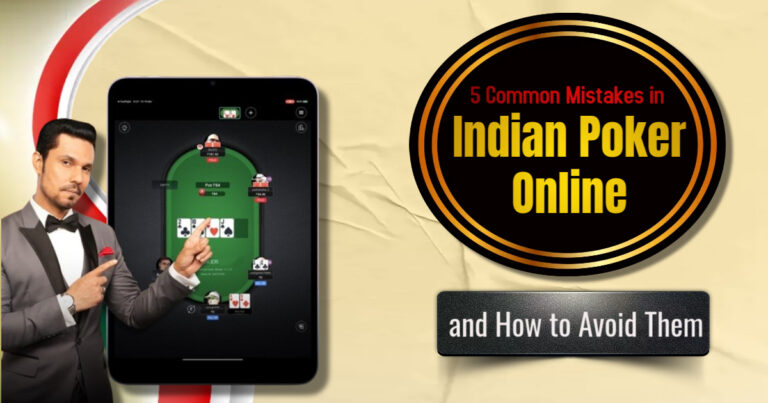Online Poker Tournaments in India: How to Prepare and Win
Online poker has emerged as one of the most popular online games in India, drawing enthusiasts from every corner of the country. The thrill of strategy, the excitement of competition, and the potential for lucrative prizes make online poker tournaments an attractive pursuit. But winning in poker tournaments isn’t solely about luck; it’s a game of skill, preparation, and psychological endurance.
In this article, we’ll explore how Indian players can prepare for online poker tournaments and increase their chances of success. Whether you’re a novice or a budding professional, these insights—relevant to poker and the Best Rummy games—will sharpen your edge and bring you closer to the winner’s circle.

The Rise of Online Poker in India
Over the last decade, online poker has gained significant traction in India. With platforms such as Adda52, PokerBaazi, Spartan Poker, and PokerStars India, Indian players have access to a wide variety of tournaments catering to different skill levels and bankrolls. From freerolls and sit-and-gos to large-scale multi-table tournaments (MTTs), there’s a tournament for everyone.
Legal developments and the shift in perception from “gambling” to a “game of skill” have also helped poker find a firm footing. Many Indian states recognize poker as a skill-based game, allowing platforms like Teen Patti Stars to operate legally and offer cash prizes.
Understanding Online Poker Tournaments
Before diving into preparation strategies, it’s crucial to understand how online poker tournaments function and identify key trends to watch. In a typical tournament, players pay a buy-in fee and receive an equal number of chips. The goal is to win chips from others and be the last person standing or among the top finishers, depending on the prize structure.
Tournaments vary by format, including:
- Freerolls: No buy-in required, often used to attract beginners.
- Sit-and-Go (SNG): Tournaments that begin when a set number of players join.
- Multi-Table Tournaments (MTTs): Large events with hundreds or thousands of participants.
- Turbo and Hyper-Turbo: Faster blind levels for quicker games.
- Knockouts/Bounty: Earn rewards by eliminating other players.
Each format requires different strategies and preparation methods.
Preparing for Online Poker Tournaments
Preparation is key in poker. Here’s how to get ready for your next big online poker tournament:
1. Master the Fundamentals
Understanding hand rankings, position, pot odds, implied odds, and betting strategies is crucial. If you’re weak on the basics, you’re unlikely to survive deep into any tournament. There are many free and paid resources available—books like Harrington on Hold’em, YouTube tutorials, and online courses—that can help build your foundational knowledge.
2. Study the Structure
Every tournament in poker in India has a different structure. Pay attention to the blind levels, starting stack size, and the speed of play. Slow-structured tournaments require patience and deep-stack strategies, while fast structures push for aggressive play. Tailor your approach based on the format.
3. Bankroll Management
One of the biggest mistakes amateur players make is failing to manage their bankroll. Never risk more than 1-2% of your total bankroll on a single tournament. This protects you from going broke during inevitable downswings and gives you enough bullets to keep playing.
4. Practice with Play Money or Low Stakes
Before jumping into high-stakes tournaments, practice with free games or low buy-in events. This helps you get accustomed to the software, develop a feel for different playing styles, and test strategies without risking significant money.
5. Use Poker Software Tools
Leverage technology to your advantage. Tools like PokerTracker, Hold’em Manager, and Equilab help analyze your hand histories, spot leaks in your game, and understand opponent tendencies. While not all tools are allowed on Indian platforms, studying with them offline is beneficial.

In-Game Strategy Tips to Win
Once you’re in the tournament, your ability to adapt and stay disciplined will determine your success. Here are key strategies to follow:
1. Early Stage – Play Tight and Observant
In the early stages, it’s best to play tight-aggressive. Avoid marginal hands and focus on building a solid chip foundation. Observe other players’ habits—who bluffs, who plays loose, and who is passive.
2. Middle Stage – Steal and Re-Steal
As blinds rise and antes kick in, stealing becomes essential. Look for spots where you can rise from a late position when others fold. Similarly, recognize when to 3-bet steal against aggressive openers. Picking up uncontested pots keeps your stack healthy.
3. Bubble Stage – Apply Pressure
When the poker game approaches the payout bubble, players tend to tighten up to secure a cash finish. Use this fear to your advantage by pressuring short stacks and passive players. However, don’t get reckless; assess each situation carefully.
4. Final Table – Balance Risk and Reward
Reaching the final table is a significant achievement. At this stage, pay attention to ICM (Independent Chip Model) considerations. Avoid unnecessary confrontations with large stacks and target shorter stacks when appropriate. Adjust your strategy based on payout jumps and stack distributions.
5. Heads-Up – Go Aggressive
If you reach the final two, be prepared for an aggressive heads-up battle. Most hands are playable, and positional advantage is magnified. Mix up your strategy, use timely bluffs, and put pressure on your opponent.
Mindset and Discipline
Mental strength is just as important as strategy. Online tournaments can last several hours, and fatigue can lead to costly mistakes. Stay focused by:
- Taking regular short breaks
- Avoiding distractions (mobile phones, TV, etc.)
- Maintaining hydration and proper posture
- Managing tilt after bad beats or losses
Discipline also means folding when necessary, resisting the urge to bluff without reason, and sticking to your plan even during losing streaks.
Legal and Responsible Gaming
While online poker is legal in many parts of India, it’s essential to check the laws in your specific state. Always play on licensed, reputable platforms. Also, practice responsible gaming—know your limits, and never treat poker as a guaranteed source of income.
Conclusion
Winning an online poker tournament in India is a blend of skill, preparation, and mental toughness. As the ecosystem continues to grow, the level of competition is also rising. Whether you’re aiming for bragging rights, side income, or a full-time poker career, preparation is your most powerful weapon.
By mastering fundamentals, analyzing your play, studying opponents, and maintaining discipline, you can significantly improve your chances of winning. Remember, every great poker champion started with a single game—your next tournament could be the beginning of your success story.
So shuffle up and deal—your seat at the final table awaits.







